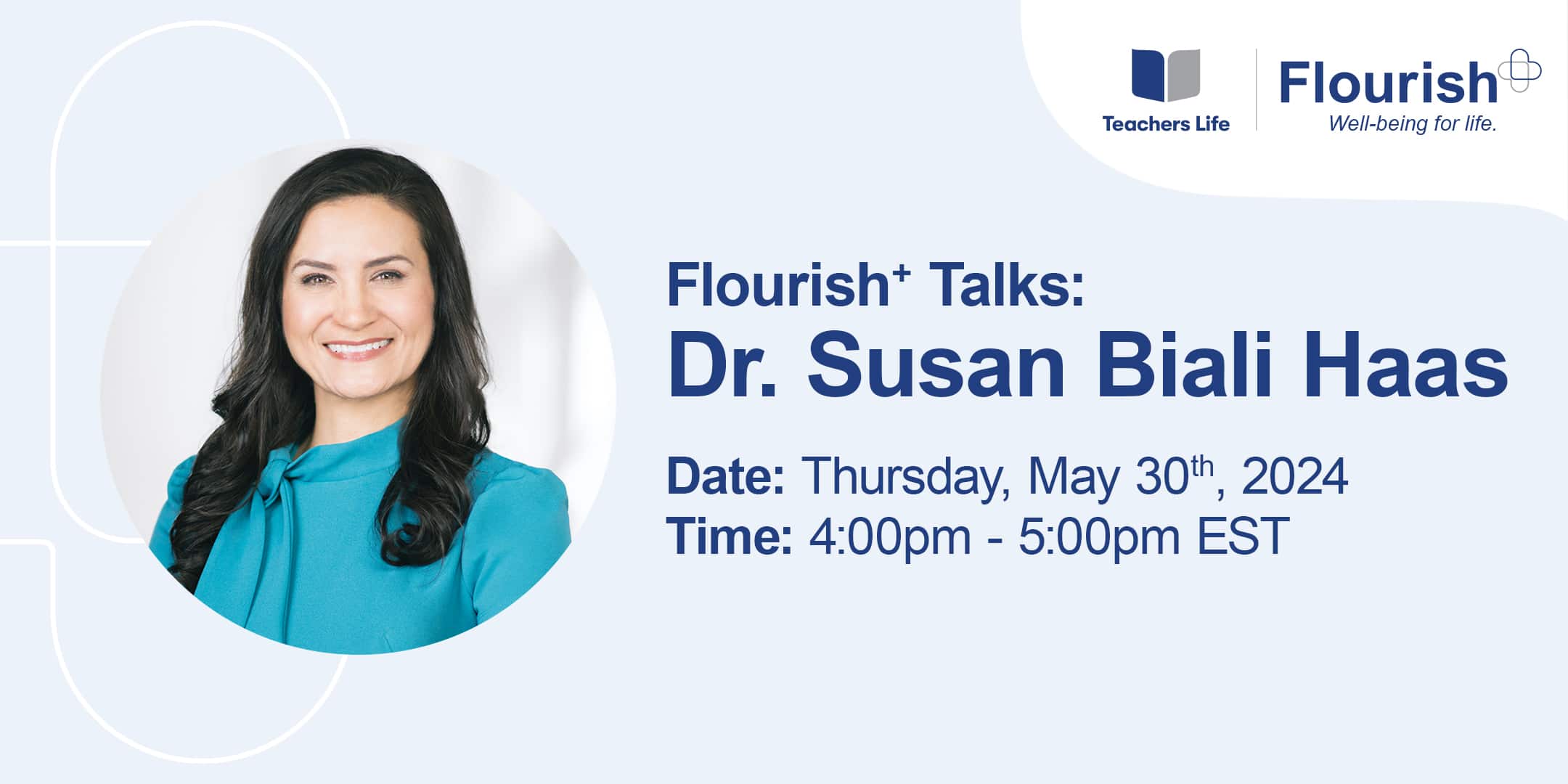
If you’ve ever experienced prolonged periods of feeling overwhelmed, stressed, and exhausted, you’re not alone. Burnout is a common issue that can affect anyone, from students and teachers to employees, entrepreneurs, and executives. Focusing on occupational burnout, let’s examine what it means to experience burnout and some effective coping strategies to overcome it.
Read to the end for an inside look at the emotional journey of our next Flourish+ Talks speaker, Dr. Susan Biali Haas, who has championed burnout after facing a critical moment with her mental health.

Burnout is a state of emotional, physical, and mental exhaustion caused by prolonged stress. *It can affect your work, relationships, and overall quality of life and can lead to a range of symptoms, including:
- Fatigue
- Insomnia
- Irritability
- Anxiety
- Depression
Burnout is not only about managing a stressful job. It also concerns how your job is carried out and impacts your lifestyle and sense of self. Many factors can contribute to burnout, including:
- A heavy workload
- Long hours
- A lack of control over your work
- Poor work-life balance
- A lack of social support
If you’re feeling any of the above symptoms, along with an overall sense of dread towards your work and an extended sense of stress that isn’t tied to one specific goal, then you may be experiencing occupational burnout.

The Impact of Burnout on Teachers & Education Workers
Although burnout can impact anyone, some professions are especially vulnerable. These typically include frontline workers, particularly those who face constant high stress and practice compassion or care towards others, such as doctors and teachers.
Teachers and education workers play a crucial role in shaping the future of our society. However, the demanding nature of their work can lead to a unique experience of burnout, especially following the COVID-19 pandemic. Burnout faced by members of the educational community can lead to a range of physical and mental symptoms that can significantly impact their well-being and the quality of education they provide. It can also greatly affect their work, relationships, and overall quality of life.
The impact of burnout on teachers has a ripple effect on students and the educational community, as it can significantly impact their work. For example, burnout can lead to challenges with motivation, creativity, and engagement in their work, which can affect student learning outcomes. It can also lead to high turnover rates among teachers and education workers, disrupting the continuity and quality of education.

Strategies for Overcoming Burnout
Although burnout can feel overwhelming, frustrating, and hopeless, it is not
permanent. There are many ways to recharge and overcome it. Practicing these simple yet effective strategies will help you restore your energy and help you maintain a balanced lifestyle to avoid getting burnt out again.
Take a Break
When everything becomes too much, sometimes you need to take a step back and give yourself the break you need.
Practice Self-Care
Acts of self-care are essential for preventing and overcoming burnout. These include getting enough sleep, nutrition, and regular exercise. Self-care also includes making time for the things that bring you joy, whether reading a book, listening to music, or spending time with friends and family.
Set Boundaries
Figuring out your workload’s boundaries is crucial to maintaining a sustainable work-life balance. Learning to set boundaries, saying no to things that don’t align with your priorities, and asking for help when needed can relieve overwhelming feelings and create more opportunities for breaks and self-care.
Seek Support
Don’t be afraid to reach out to family, friends, or a mental health professional for support. Talking to someone about your feelings can help you feel less alone and provide valuable insight, resources, and advice.
By taking these steps, you can overcome burnout and feel more energized, productive, and fulfilled in your work and personal life. Remember, burnout is a common problem, but not a permanent one. With the right strategies and support, you can overcome burnout and thrive!

Creating a Positive Work Environment
Individual strategies are great, but creating a positive work environment is also essential for creating an efficient and energized team of employees. If you’re in a leadership role at your work, here are some ways you can improve your workplace atmosphere and help your employees, especially education workers, overcome and prevent burnout:
Provide Support
Teachers, education workers, and employees across every field need support to prevent and overcome burnout. Support can include ensuring access to mental health services, professional development opportunities, and peer support networks.
Reduce Workload
Teachers and education workers often have heavy workloads, which can contribute to burnout. Reducing workloads through streamlining administrative tasks, providing adequate planning time, and limiting extracurricular responsibilities can all contribute to more efficient work and an improved work-life balance for employees.
Encourage Self-Care
Self-care is essential for preventing and overcoming burnout. It’s important to encourage and support employees to engage in self-care practices that will help improve and maintain their well-being. These practices include taking breaks, especially to rest, eat and exercise.
Foster a Positive Work Environment
A positive work environment can help prevent burnout by promoting teamwork, collaboration, and open communication. Encourage a culture of support, recognition, and appreciation for the daily hard work that teachers, education workers, and employees do.
Supporting the well-being of those around you is vital to ensuring that we all flourish and thrive together. Teachers Life’s new Member benefits program, Flourish+, is our initiative to go beyond the ordinary and provide newly enhanced, meaningful, complimentary healthy living benefits, rebates, awards, and give back for mental health. Flourish+ Talks is just one of our many Member benefits, focused on well-being for life.

Exclusive Insight from Dr. Susan Biali Haas
Looking for more exclusive insights on how to overcome and prevent burnout? Join us for the second Teachers Life Flourish+ Talk featuring Dr. Susan Biali Haas on May 30th from 4:00 – 5:00 pm. Flourish+ Talks is a quarterly series of virtual wellness speaking events that allow our Teachers Life, nowly and OTIP Members to gather as a community and hear inspiring stories from Canadian mental health keynote speakers.
Dr. Susan Biali Haas, M.D. is an acclaimed medical doctor, wellness expert, coach, speaker, and author. Overcoming burnout and depression early in her medical career, she has become an internationally recognized influencer in health and well-being. Dr. Susan empowers people to enhance their lives. Dr. Susan holds a Doctor of Medicine, a Bachelor’s in Dietetics, various accolades, and two decades of wellness and resiliency study, clinical experience, and a decade of coaching high-performance clients globally.
Take advantage of this incredible opportunity to gain knowledge, connect with like-minded individuals, and flourish with Dr. Susan Biali Haas. Please mark your calendars and join us online for the Teachers Life Flourish+ Talk. This event promises inspiration, empowerment, and a dash of resilience.
We can’t wait to see you there!
*Disclaimer: The information in this article is not professional clinical or medical advice. Please talk to your doctor if you are experiencing critical mental or physical health issues or call 911 if you are in immediate crisis.
All articles and other information posted on http://teacherslife.com are intended to be informational only and not for the purpose of providing any health, medical, financial, insurance, legal, accounting, tax or other advice. Teachers Life does not guarantee or represent that any information in these articles or elsewhere on this website is accurate, complete, current or suitable for any particular purpose. You use or rely on such information solely at your own risk. All articles and website content are the property of Teachers Life and all rights are reserved. IN NO EVENT WILL TEACHERS LIFE BE LIABLE FOR ANY LOSS OR DAMAGE YOU INCUR RELATED TO YOUR USE OR RELIANCE OF THE INFORMATION IN THESE ARTICLES OR ELSEWHERE ON THE WEBSITE. See the Terms of Use for more information.
